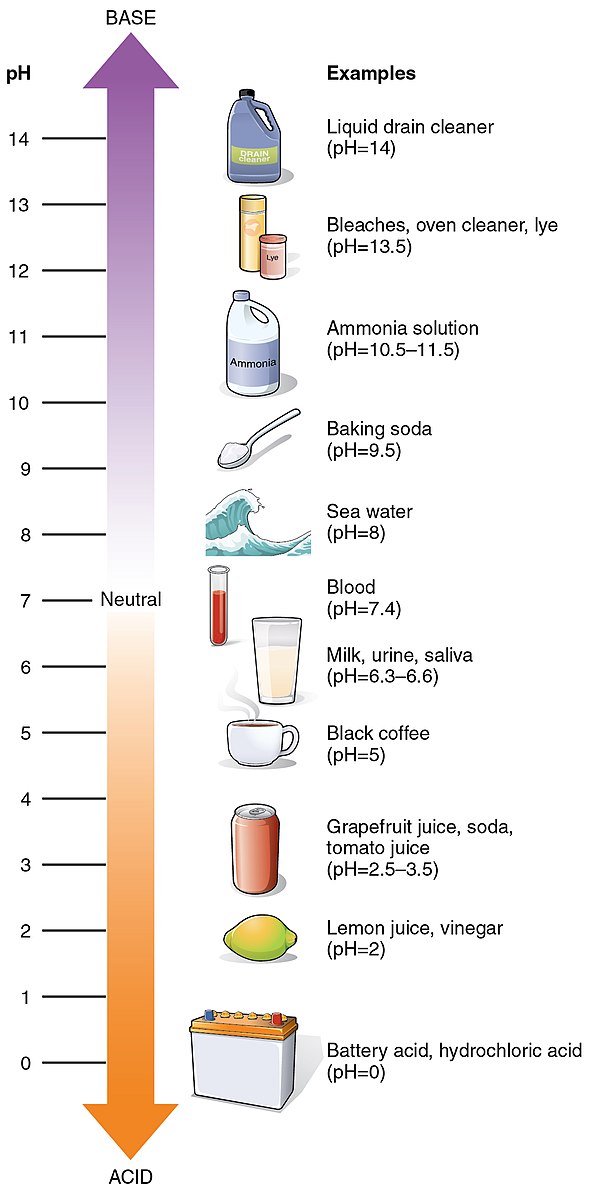The pH value of formation water is a critical parameter in the oil and gas industry, as it can significantly impact the formation’s permeability, the solubility of certain minerals, and the potential for scale formation or corrosion. Understanding the pH of formation water is essential for maintaining optimal production conditions and preventing formation damage.
Importance of pH in Formation Water
The pH of formation water typically ranges from 4 to 9, while drilling and completion fluids, as well as filtration water of cement slurries, exhibit a pH in the range of 8-12. In the case of the Bakken Shale, the pH of the formation water is controlled by feldspar-clay equilibria, and changes in pH during pressure drop from in situ to surface conditions can lead to the formation of calcite scale, anhydrite scale, or halite scale, particularly in the most saline samples.
Measuring the pH of Formation Water
 Image source: OpenStax College
Image source: OpenStax College
Various methods can be used to determine the pH of formation water, such as electrode and meter measurements, pH paper strips, or colorimetric methods. However, when the water contains large amounts of dissolved salts, as is often the case in oilfield waters, careful, direct pH measurement is the best approach for accurate pH determination. Some sophisticated computer models can also provide reasonable predictions of pH at moderate conditions of brine temperature and pressure.
Managing the pH of Formation Water
In terms of home remedies or DIY solutions for managing the pH of formation water, it is essential to note that any adjustments to the pH should be carried out with caution, as even slight changes can have significant impacts on the formation’s properties and the production process. One possible approach for reducing the pH of formation water is the addition of acidic substances, such as hydrochloric acid or acetic acid, to neutralize the alkalinity. However, this method should only be used after careful consideration of the potential consequences and under the guidance of a qualified professional.
Contaminants and Substances in Formation Water
Regarding contaminants, chemicals, and substances present in formation water, it is crucial to consider the specific context and composition of the water in question. In the case of the Bakken Shale, the formation water contains high levels of total dissolved solids (TDS), including sodium, chloride, and bicarbonate ions, which can affect the pH and scale formation potential. Additionally, the presence of drilling mud, cement slurries, or other injection fluids can introduce further contaminants or alter the pH of the formation water.
Treatment Methods for Formation Water
To address these challenges, various treatment methods can be employed, such as chemical precipitation, ion exchange, reverse osmosis, or electrodialysis. The choice of treatment method will depend on the specific composition and properties of the formation water, as well as the desired outcomes and constraints of the treatment process.
Conclusion
In summary, the pH of formation water is a critical parameter in the oil and gas industry, with significant implications for formation permeability, mineral solubility, and the potential for scale formation or corrosion. Accurate measurement and monitoring of the pH, as well as careful consideration of any adjustments or treatment methods, are essential for ensuring optimal production conditions and preventing formation damage.
References:
– Kan, J. R., Thyne, G. D., & Brady, P. V. (2013). Evaluation of Formation Water Chemistry: Bakken Shale. OSTI.GOV. https://www.osti.gov/biblio/1339255
– Renpu, W. (2011). Determination of critical alkalinity (pH) in Fahliyan carbonate reservoir. Journal of Petroleum Science and Engineering, 75, 38-45. https://doi.org/10.1016/j.petrol.2011.05.006
– Produced water properties. (2016). PetroWiki – Society of Petroleum Engineers. https://petrowiki.org/Produced_water_properties
– Formation water treatment. (n.d.). Water Treatment Technologies. https://watertreatmenttechnologies.com/formation-water-treatment/
